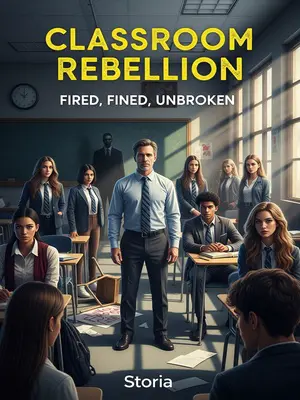Chapter 1: The Night Everything Changed
We broke every record in the school, but all it took was one night for the parent group chat to turn on me.
The ping of my phone kept me up later than I wanted. My screen glowed with a stream of messages—each one reading more like an accusation than a question. My phone buzzed with: "Not to be that mom, but..." and "Just saying, my kid needs more structure! 🙄" I could practically hear their voices, sharp and insistent, like parents fighting over the last spot on the travel soccer team.
"Other teachers only give the kids one day off a week. Why do you let them sleep in on Saturdays? Aren't you putting their futures at risk? Are you really preparing them for the real world? I just don’t think this is what a top teacher should do."
The question sat there, heavy as a bag of textbooks. I’d just spent my weekend combing through lesson plans and making sure everyone had a shot at their dream schools, but suddenly, it was like none of that mattered to them.
"We demand a new teacher! I won't let someone like you—just talk, no real results—ruin my child's future. That Mr. Franklin from the next class is way better—he keeps his students in class all seven days. Kids these days need a high-pressure environment!"
The names and faces blurred together on my phone, each message more frantic than the last. It was almost funny—if you could forget these were the same parents who sent Christmas cards with their kids' school portraits tucked inside.
I didn’t bother arguing. I let them vent as much as they wanted.
Arguing with them was like teaching calculus to a brick wall. I knew there was no point; they’d made up their minds. So I just let their words scroll by, unbothered—at least on the outside.
I know Mr. Franklin well.
He ran his class like a boot camp—no excuses, no breaks, just results. Out of the fifty kids in his class, more than half have been struggling with mental health issues.
The whole faculty knew his style—always pushing, never pausing to ask who needed a breather. I’d seen kids in the hallway with red-rimmed eyes, clutching coffee instead of breakfast, faces drawn tight with worry. Some teachers called it "rigor." I called it burnout. I once overheard a student mutter, "If this is what it takes to get into college, maybe I don’t want it."
Sure enough, it wasn't long before the neighboring class had several cases of depression and even suicide attempts.
It was the kind of news that sends a chill through the breakroom—the kind that makes you check in on your quietest students, just in case. We all heard the rumors, but no one wanted to admit how bad it really was until it was staring us in the face, cold and undeniable.
I've been teaching senior classes for years now.
The walls of my classroom are lined with college pennants and handwritten thank-you notes—evidence of a job I took seriously. Every spring, I'd watch as graduation gowns shuffled out the doors, pride swelling in my chest.
Sixty percent of my kids get into top state schools, a third land Ivy League spots, and the rest find their way to the best private colleges in the country. But I remember every name, every cupcake, every late-night essay session.
You could say that ever since I started teaching—except for my first two years in rural districts—not a single student in my class has fallen behind in the high-stakes battle for college admissions.
I wore it like a badge of honor, though honestly, I still remembered the faces of those first rural students—the ones who made do with less, but whose gratitude meant more than any Ivy League acceptance.
I never expected that one day, I'd be attacked head-on by my students' parents:
"Other teachers only give the kids one day off a week. Why do you let them rest and sleep in on Saturdays instead of making them study? Aren't you holding them back? Are you really preparing them for the real world? I just don’t think this is what a top teacher should do."
It was like déjà vu, the same script playing out again, only this time the stakes felt even higher. I’d spent more late nights preparing individualized plans than I could count—yet here I was, my methods under fire.
No matter how much experience I have, no matter how many tough, rebellious students I've worked with—
At this moment, facing parents who were eight hundred times more demanding, entitled, and unreasonable than any student troublemaker, I truly felt like I was banging my head against a brick wall.
I’d handled football players caught cheating, students dealing with breakups or panic attacks, but nothing had prepared me for the relentless, anonymous nature of a parent group chat gone feral.
"With my child's talent, making the top ten in the state should be easy. It's only because you're not doing your job as homeroom teacher that, with college applications coming up, my kid can't even break the top fifty. Aren't you holding them back?"
Their words stung not because they were true, but because they missed everything else—the effort, the struggles, the late-night pep talks. As if success was just a matter of pushing harder, not living better.
"And you have the nerve to call yourself a gold-star teacher? You're just misleading the students."
The label made me wince. I never asked for the recognition, but now it felt like a target on my back.
"Your laid-back teaching style is just hurting them."
No mention of the kids who’d blossomed, only the ones who hadn’t made it to the top of some imaginary scoreboard.
"My son is so smart—he could easily get into Harvard or Stanford. Yet you actually told him not to put too much pressure on himself, and even said the choice of major is more important than the college. Isn't that just wrong?"
I remembered that conversation vividly. The kid had been on the edge—dark circles, hands shaking. I’d hoped to take some weight off his shoulders, not set his parents against me.
"Change the teacher! I won't let someone like you, all talk and no substance, ruin my child's future."
The chorus only got louder, their confidence growing with every like and heart reaction in the chat.
"That Mr. Franklin in the next class is great. He keeps his students in class seven days a week and believes in strict, high-pressure education. That's exactly what my kid needs."
I could almost picture their relief, their belief that someone with a firmer grip could shape their children into perfect college material.
The parents came at me from all sides. With just two hands, I couldn't fend off a whole crowd, so I just stepped back.
The more I read, the more my resolve hardened. No amount of arguing would change their minds tonight.
Me: "Whether it's changing teachers or switching classes, those aren't decisions the homeroom teacher can make alone. If any parents are dissatisfied with me, you can bring it directly to the school."
I kept my tone measured, professional. I knew they'd see it as dodging, but I refused to play their game.
After sending that last message, I stopped reading the personal attacks flying through the parent group and flipped my phone face-down on the desk.
A small act of rebellion—choosing peace over endless scrolling. The blue glow from my phone painted my face, while the rest of the apartment stayed stubbornly dark. The soft thump of my phone hitting the wood was a tiny relief.
My eyes drifted down, settling under the cold glow of the desk lamp, on a stack of real SAT and ACT practice exams from across the country that I'd compiled over countless early mornings and late nights—I'd just finished grading the multiple-choice section for one set.
There was still the scent of Sharpie lingering from my last round of feedback. My notes were meticulous, every red check a sign that I’d really seen my students.
Beside them was a new review plan I'd drafted, tailored to each student's needs based on their recent mock exam results.
Color-coded sticky notes stuck out at odd angles—a visual reminder of how different each kid was, and how much I cared about making sure each one had a shot.
I sat in silence for a few seconds.
Sometimes silence is the only thing that makes sense. The hum of the fridge in the corner, the streetlight slanting in through the blinds—it was all I needed to gather myself.
I took off my glasses, put down my pen, and shut off the computer.
The silence felt heavy, like the air after a tornado warning—calm, but only because everything had already been uprooted.
Doing my best to ignore the phrase "careful what you wish for—you just might get it" echoing in my mind, I got up, washed up, went to bed, and closed my eyes.
As I turned off the bathroom light and crawled under the covers, I let myself breathe—just for a minute, just for me. Tomorrow would be another day.
To hell with what anyone else wants.
But as I closed my eyes, I couldn’t help but wonder—how many more nights like this could I take?













